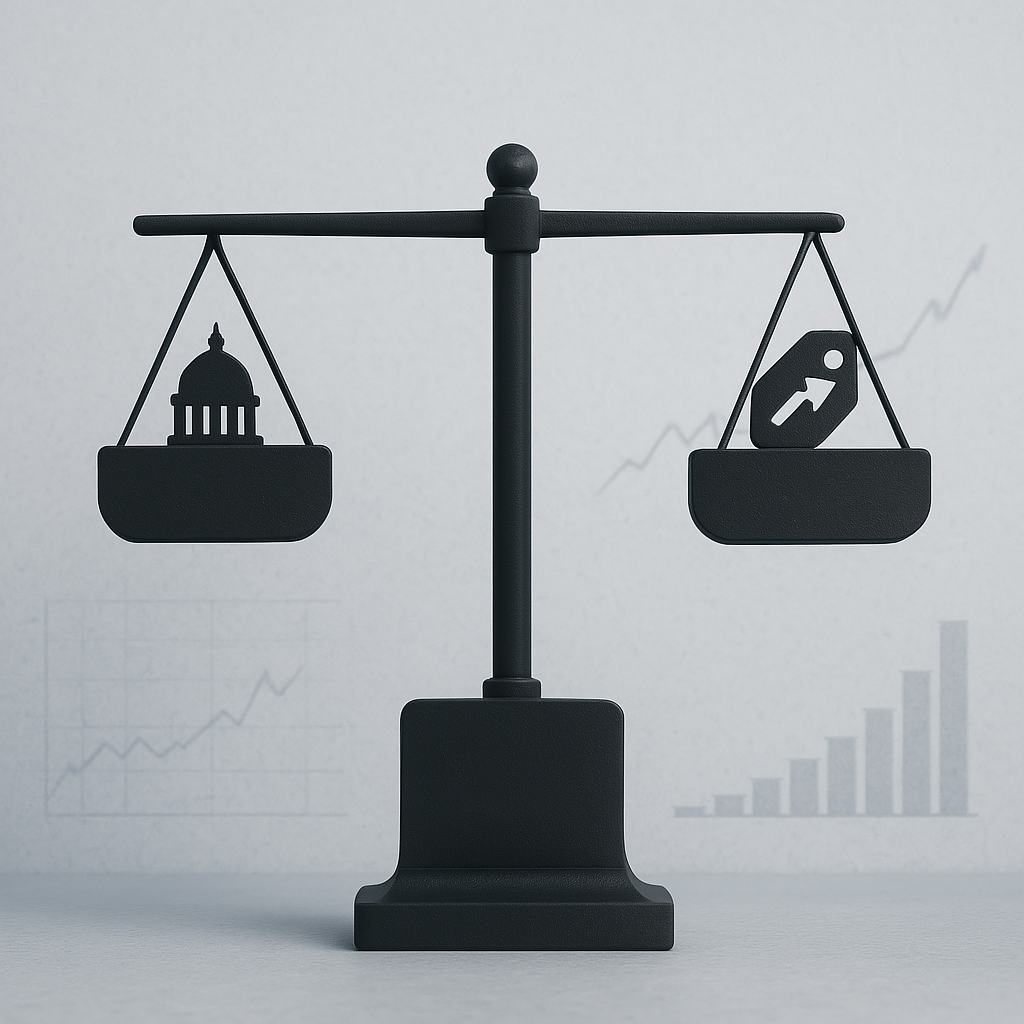By Tim Courtney, Chief Investment Officer
As we move through the second quarter, we are focused on the three areas that most influence markets today: policy, inflation, and Gross Domestic Product (GDP).
Policy: Tariffs have been the main headline story so far this year, and this policy can change day-to-day. This policy will have an outsized effect on markets, but since we don’t know how it will ultimately be implemented, trading strategies beforehand are simply a guess. Tariffs are not the only policy affecting markets, though. We’ve seen discussion around spending cuts from the administration.
A recent comment from Treasury Secretary Scott Bessent stood out: he said the U.S. may need to go through a “detox period” as the economy transitions away from public spending,1 suggesting that the economy has avoided recession only because of large deficit spending. The stated goal is to “detox” slowly, but the odds of a recession have risen.
As for tax law, there hasn’t been much movement on the 2017 Tax Cuts and Jobs Act. It’s scheduled to expire this year;2 however, it is generally expected that the current tax rates will be extended.
Inflation: Toward the end of last year, inflation had cooled to around 2.5 percent.3 The Fed had started to ease rates, thinking inflation had been tamed. But that changed quickly. Inflation ticked back up to 3 percent, and the Fed paused its cuts.4 Now it’s unclear where inflation is headed next, especially with so many moving parts influencing it.
A lot of this ties back to tariffs and supply chains. From the early 2000s through much of the 2010s, inflation stayed between 1.5 and 2 percent,5 in part because globalization helped hold prices down. As companies shifted production to lower-cost countries, price increases were more subdued. That’s no longer the case, as production is now moving back to higher-cost areas like the U.S., Mexico, and Canada.6 That change comes with higher prices; therefore, we may not return to the low-inflation environment we were used to for quite some time.
GDP: There is a real chance that first-quarter GDP could be negative.7 That wouldn’t necessarily mean a recession, but it would reflect timing effects. Many companies moved up their imports to get ahead of tariffs, and because imports subtract from GDP,8 that spike could bring the number down temporarily.
Another thing we’ll be watching is investment flows. For years, foreign capital has been coming into the U.S., helping push up prices in housing and the stock market, especially in large-cap tech.9 But there are signs that some of those capital flows may now be reversing. The Magnificent Seven stocks, which had driven much of the market’s gains, had a rough start to the year.10 If we see capital starting to flow out of these areas, it could have broader implications for the overall market.
The S&P 500 experienced a technical correction during the quarter.11 However, investors holding diversified portfolios weathered the storm: Value stocks, international equities, bonds, and real assets were mostly positive. While the quarter wasn't particularly exciting, it turned out to be steady for investors with diversified portfolios.
If you’d like to explore how policies, inflation, and capital flows could affect assumptions in your long-term plan, we encourage you to contact your Exencial advisor.
Sources
- CNBC (3/7/25) - Treasury Secretary Bessent says economy could be ‘starting to roll a little bit’
- Forbes (3/17/25) - Trump Tax Cuts Explained: What Provisions Of The TCJA Expire In 2025?
- NBC News (9/11/24) - Inflation cools to 2.5%, slowest rate in more than three years
- Bankrate (3/22/25) - Inflation slowed more than expected last month, but prices remain high — here’s what’s rising most
- US Inflation Calculator (data as of 4/8/25) - Current US Inflation Rates: 2000-2025
- Manufacturing Dive (10/21/24) - More US-based companies to shift supply chain operations into Americas: report
- Federal Reserve Bank of Atlanta (3/2/25) - First-Quarter GDP Growth Estimate Declined
- Federal Reserve Bank of St. Louis (9/4/18) - How Do Imports Affect GDP?
- Investopedia (6/6/24) - Foreign Direct Investment (FDI): What It Is, Types, and Examples
- Investopedia (3/31/25) - Why the Magnificent Seven Stocks Just Had Their Worst Month and Quarter on Record
- The New York Times (3/13/25) - Stocks Tumble Into Correction as Investors Sour on Trump
PAST PERFORMANCE IS NOT AN INDICATION OF FUTURE RETURNS. Information and opinions provided herein reflect the views of the author as of the publication date of this article. Such views and opinions are subject to change at any point and without notice. Some of the information provided herein was obtained from third-party sources believed to be reliable but such information is not guaranteed to be accurate. In addition, the links provided within are for convenience only and the provision of the links does not imply any sponsorship, endorsement, or approval of any of the content. We do not guarantee the content or its accuracy and completeness. The content is being provided for informational purposes only, and nothing within is, or is intended to constitute, investment, tax, or legal advice or a recommendation to buy or sell any types of securities or investments. The author has not taken into account the investment objectives, financial situation, or particular needs of any individual investor. Any forward-looking statements or forecasts are based on assumptions only, and actual results are expected to vary from any such statements or forecasts. No reliance should be placed on any such statements or forecasts when making any investment decision. Any assumptions and projections displayed are estimates, hypothetical in nature, and meant to serve solely as a guideline. No investment decision should be made based solely on any information provided herein and the author is not responsible for the consequences of any decisions or actions taken as a result of information provided in this book. There is a risk of loss from an investment in securities, including the risk of total loss of principal, which an investor will need to be prepared to bear. Different types of investments involve varying degrees of risk, and there can be no assurance that any specific investment will be profitable or suitable for a particular investor’s financial situation or risk tolerance. Exencial Wealth Advisors, LLC (“EWA”) is an investment adviser registered with the Securities & Exchange Commission (SEC). However, such registration does not imply a certain level of skill or training and no inference to the contrary should be made. EWA may only transact business in those states in which it is registered, notice filed, or qualifies for an exemption or exclusion from registration or notice filing requirements. Complete information about our services and fees is contained in our Form ADV Part 2A (Disclosure Brochure), a copy of which can be obtained at www.adviserinfo.sec.gov or by calling us at 888-478-1971.
The Magnificent Seven is a group of high-performing U.S. stocks and includes Alphabet, Amazon, Apple, Meta Platforms, Microsoft, NVIDIA, and Tesla.
S&P 500® Index (S&P 500®) is widely regarded as the best single gauge of large-cap U.S. equities. The index includes 500 leading companies and covers approximately 80% of available market capitalization.








